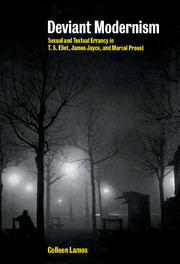Book contents
- Frontmatter
- Contents
- Acknowledgments
- List of abbreviations
- Introduction
- 1 Straightening out literary criticism: T. S. Eliot and error
- 2 The end of poetry for ladies: T. S. Eliot's early poetry
- 3 Text of error, text in error: James Joyce's Ulysses
- 4 Sexual/textual inversion: Marcel Proust
- Conclusion
- Notes
- Index
2 - The end of poetry for ladies: T. S. Eliot's early poetry
Published online by Cambridge University Press: 22 September 2009
- Frontmatter
- Contents
- Acknowledgments
- List of abbreviations
- Introduction
- 1 Straightening out literary criticism: T. S. Eliot and error
- 2 The end of poetry for ladies: T. S. Eliot's early poetry
- 3 Text of error, text in error: James Joyce's Ulysses
- 4 Sexual/textual inversion: Marcel Proust
- Conclusion
- Notes
- Index
Summary
There's no man in the world
More bound to's mother.
Shakespeare, CoriolanusSome dissatisfaction
With myself, I suspect, very deep within myself
Has impelled me all my life to find justification
Not so much to the world – first of all to myself.
What is this self inside us, this silent observer,
Severe and speechless critic, who can terrorise us
And urge us on to futile activity,
And in the end, judge us still more severely
For the errors into which his own reproaches drove us?
Eliot, The Elder Statesman“T S Eliot ends [the] idea of poetry for ladies,” James Joyce wrote in one of his notebooks from the early 1920s. Joyce's private assessment of Eliot's poetry is in keeping with the publicly stated aims of many writers of the period. It is, moreover, in agreement with the generally accepted judgment of Anglo-American high modernism as marking the demise of an increasingly enfeebled Victorian and Georgian poetic tradition.
The pronouncements of such influential figures as Ezra Pound, T. E. Hulme, and Wyndham Lewis make clear that one of the chief aims of the modernist movement, as they defined it, was the restoration of virility to poetry. Despite the variety among and the shifts within the views of individual writers, the rhetoric of modernist polemics often endorsed implicitly masculine aesthetic values. Pound praised “hard” poetry, “as much like granite as it could possibly be,” as opposed to “soft” poetry with “mushy technique” and “emotional slither.”
- Type
- Chapter
- Information
- Deviant ModernismSexual and Textual Errancy in T.S Eliot, James Joyce, and Marcel Proust, pp. 55 - 117Publisher: Cambridge University PressPrint publication year: 1998

